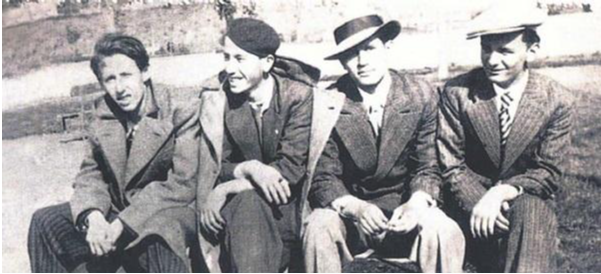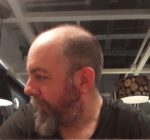Translated from the Turkish by Neil P. Doherty

From left to right: Orhan Veli, Şinasi Baray (an artist friend), Oktay Rifat, Melih Cevdet Anday.
The Garip or Strange movement was the first great modernising movement in Turkish poetry. It was founded by three poet friends: Orhan Veli, Melih Cevdet Anday, and Oktay Rifat. The dictionary defines the word “Garip” as “strange, foreign, far from home”. However, it might, in this context, also be translated as “uncanny” or “alienating”. The poems that were later gathered in the single volume called “Garip” that was published in 1941 started to appear in “Varlık”, a well-known literary magazine, in the late 1930s. The poems seemed very alien and alienating to readers as they not only eschewed rhyme but had nothing of the rich imagery and ornate language that were early modern Turkish poetry’s inheritance from the Ottoman period. Gone to were lofty statements or patriotic sentiments to be replaced by the concerns of the loafers, idlers, and dreamers one would find on the streets and in the coffeehouses of Istanbul who were observed with great humour and described in devilish irony. Readers were perplexed by poems that, instead of using the old poetic tropes, were stripped of metaphor and seemed almost pointless. This hugely important and radical movement doesn’t feature in western histories of modernism yet without knowledge of what went on in languages like Turkish that are perceived to lie on the periphery then no full picture of the scope of literary modernism can emerge.
OKTAY RİFAT (10 June 1914 – 18 April 1988) was a poet, novelist and playwright. After the death of Orhan Veli, he moved away from the ‘Garip/Strange’ style and began to write a complex and modern poetry that brought together Turkish folk poetry and modern French influences into an original and distinctive style. He was writing up to the time of his death in 1987.
ORHAN VELI (14 April 1914 – 14 November 1950) was probably the driving force behind the ‘Garip/Strange’ movement and was responsible for writing its hugely important manifesto. He managed to cram an impressive volume of works including essays, articles, and translations into 36 short years. His early death was a huge tragedy for Turkish and world poetry.
MELIH CEVDET ANDAY (13 March 1915 – 28 November 2002) was a poet, novelist, essayist and playwright. Like Oktay Rifat he too moved away from the Garip/Strange aesthetics in the late 1940’s and began to write in a more philosophical vein and devoted many years to exploring the various ancient civilizations of Anatolia. Save for his initial involvement in Garip his poetry always stood alone, unattached to any movement or school
Oktay Rifat
Stars
A notebook beside the book
A glass beside the notebook
A child beside the glass
A cat and a white carnation
Beside the child…
But why are my books, my tie
And this small ashtray
Not out there beside the stars?
Bread and Stars
Bread on my knees
Stars out in the distance, far away
I’m eating bread, looking at the stars
So wrapped up in thought
That sometimes, by accident
I eat a star instead of bread
The Swallow
This telegraph pole here reminds me
Of a swallow;
And the swallow of traveling;
But before, the swallow
Usually just reminded me
Of home.
Zurna*
I sell worry beads
And play cards
I’d listen to the zurna
If anyone’d play it.
I can’t be doing with any hassle
For I’m idle, bone idle.
Thankful
I should thank
My boots and my coat.
And a word too, for this falling snow
For this day, this joy.
I’m grateful I can walk over the snow,
And that there’s sky and ground;
So thank God for fire for water
And for those stars whose names I don’t know.
*Zurna is a woodwind instrument used often in folk music.
Orhan Veli
Robinson
My granny was the best
Of all my childhood friends
Ever since the day we dreamed up schemes
To save poor Robinson from his deserted island
And cried together
For all helpless Gulliver
Suffered
In the land of the giants
Birds Tell Lies
Look coat just don’t believe
A thing the birds say;
It’s you I confide in.
Don’t believe this lie
The birds spin each spring
Coat, don’t believe a single thing
My Shadow
I’m sick to death of dragging it about
On the tip of my feet, year in, year out
Let us now live a bit,
My shadow by itself
And me on my own.
?
Why do I think of masts
When someone says harbours
And when someone says sails, the open sea?
Of cats when someone says March
Of workers when someone talks of rights
And why does the old miller
Believe in God without a single thought?
And why, in windy weather
Does the rain come down all crooked?
My Eyes
My eyes,
Where’re my eyes?
The devil ran away with them
But couldn’t flog them
so brought them
right back
My eyes,
Where are my eyes?
Melih Cevdet Anday
Sparrow
Little sparrow of mine
There on the clothes line!
Are you looking at me in pity?
Ah whatever, I’m still going to watch
You fly under this sun
And the first white leaves of spring.
The Leaves High Up in the Trees
Can’t be reached.
They’re just for the birds and the sun.
Better if we know nothing
Of those leaves so high up.
Like Our Hands
Because animals can’t speak
Who knows, just like our hands,
What fine thinkers they might be.
Ah, but before sitting down to read
You ought to water the flowers.
Letter From a Dead Friend
I live like I used to really,
Sauntering about, thinking
Though now I board the train and ferry with no ticket
And shop without ever having to haggle.
At nights I’m at home, taking my ease
(If only I could open the window when I’m fed up)
Ah…but I’d love to scratch my head, to pick a flower
And to shake someone’s hand every now and then.
On a Visit
If I was to go on a visit
And they made up a clean bed for me
If I was to forget everything, even my name
And just fall asleep.
Also, read “When They Told You and Other Poems— Francesco Tomada“ published in The Antonym:
Follow The Antonym’s Facebook page and Instagram account for more content and exciting updates.


























0 Comments